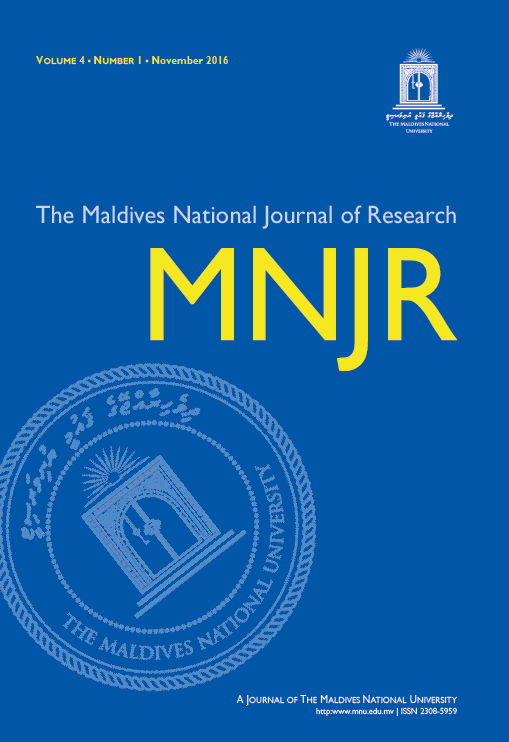Determinants of Foreign Direct Investment in the Maldives: A Multiple Regression Analysis
DOI:
https://doi.org/10.62338/jy1y5f58Keywords:
FDI, Maldives, Small Island Developing States (SIDS)developing countries, economic growth, TourismAbstract
This main objective of this study is to investigate the determinants of foreign direct investment (FDI) based on selected variables in the Maldives. Multiple regression analysis was performed on data collected from the World Bank, the Maldives Monetary Authority, and the International Monetary Fund (IMF), covering the period from 1991 to 2022. The study employs a multiple regression model with FDI as the dependent variable, and the exchange rate, merchandise account, current account balance, and tourist arrivals as independent variables. The results reveal that tourist arrivals and current account balance significantly impact FDI, indicating that these two factors play a key role in attracting FDI to the Maldives. The findings have important implications for policymakers, investors, and stakeholders focused on attracting foreign investment, which could contribute to economic growth in the Maldives.
References
Al-kasasbeh, O., Alzghoul, A., & Alghraibeh, K. (2022). Global FDI inflows and outflows in emerging economies Post-COVID-19 era. Future Business Journal, 8(1), 53. https://doi.org/10.1186/s43093-022-00167-z
Assunção, S., Forte, R., & Teixeira, A. (2013). Location determinants of FDI: Confronting theoretical approaches with empirical findings. Argumenta Oeconomica, 31, 5–28.
Denisia, V. (2010). Foreign Direct Investment Theories: An Overview of the Main FDI Theories. 3.
Dunning, J. (2000). The Eclectic Paradigm as an Envelope for Economic and Business Theories of MNE Activity. International Business Review, 9, 163–190. https://doi.org/10.1016/S0969-5931(99)00035-9
Dunning, J. H. (1988). The Eclectic Paradigm of International Production: A Restatement and Some Possible Extensions. Journal of International Business Studies, 19(1), 1–31. https://doi.org/10.1057/palgrave.jibs.8490372
Hassan Haneef. (2010). Foreign direct investment into Maldives through medical tourism. https://archives.kdischool.ac.kr/bitstream/11125/30459/1/Foreign%20direct%20investment%20into%20Maldives%20through%20medical%20tourism.pdf
https://www.lloydsbanktrade.com/en/market-potential/maldives/investment
Huu Cung, N. (2021). Labor Force and Foreign Direct Investment: Empirical Evidence from Vietnam. Journal of Asian Finance Economics and Business, 8, 103–112. https://doi.org/10.13106/jafeb.2021.vol8.no1.103
Lloyd Bank (2024) Maldives: Investing in the Maldives. Llyod Bank
Makoni, P. (2015). An extensive exploration of theories of foreign direct investment. Journal of Risk Governance and Control:Financial Markets and Institutions, 5, 77–83. https://doi.org/10.22495/rgcv5i2c1art1
Meivitawanli, B. (2021). Research on the relationship between provincial foreign direct investment and economic growth: An empirical study in Indonesia. Journal of International Studies, 14(1), 241–257. https://doi.org/10.14254/2071-8330.2021/14-1/17
Ministry of Economic Development. (2019). Doing business in Maldives 2019- This guide is an introduction to the business environment of Maldives. Ministry of Economic Development. https://www.maldivesembassy.or.th/media/attachments/2019/08/23/doing-business-maldives-trade-min.pdf
Ministry of Tourism. (2023). Maldives Fifth Tourism Master plan 2023-2027: Goals and Strategies. Ministry of Tourism. https://www.tourism.gov.mv/dms/document/4969b4831928f1bdf3506340fb6974fc.pdf
Mudiyanselage, M. M. R., & Epuran, G (2022). The Determinants of FDI Inflows in Romania. New Challenges in Accounting & Finance (NCAF), 8. https://api.eurokd.com/api/Articles/GetArticleFile/10.32038/NCAF.2022.08.02.pdf
Najeeb, F. (2020). Foreign Direct Investment: How Has Maldives Fared? SSRN Electronic Journal. https://doi.org/10.2139/ssrn.3776702
Pradhan, R. P. (2011). Determinants of foreign direct investment in SAARC countries: An investigation using panel VAR model. Information Management and Business Review, 3(2), 117-126. https://ojs.amhinternational.com/index.php/imbr/article/view/924
Ridzuan, A. R., Ismail, N. A., & Hamat, A. (2018). Modeling macroeconomic determinants for foreign direct investment inflows in ASEAN-5 countries. International Journal of Economics and Management, 12.
Rugman, A. M. (2010). Reconciling internalization theory and the eclectic paradigm. Multinational Business Review, 18(2), 1–12. https://doi.org/10.1108/1525383X201000007
Samimi, A., Sadeghi, S., & Sadeghi, S. (2011). Tourism and economic growth in developing countries: P-VAR approach. Middle-East Journal of Scientific Research, 10.
Shahud, M. (2022) The case for de-risking investments to attract private capital for underserved sectors in the Maldives, UNDP Maldives- Economic Bulletin. https://www.undp.org/sites/g/files/zskgke326/files/2022-08/Economic%20Bulletin.%20UNDP%20MV.%20Issue%2004%2C%20Aug%202022.pdf
United Nations Conference on Trade and Development (UNCTAD). (2023). World Investment Report 2023: Investing in sustainable energy for All. United Nation. https://unctad.org/system/files/official-document/wir2023_en.pdf
United States Department of State. (2021). 2021 Investment Climate Statements: Maldives. United States Department of State. https://www.state.gov/reports/2021-investment-climate-statements/maldives



